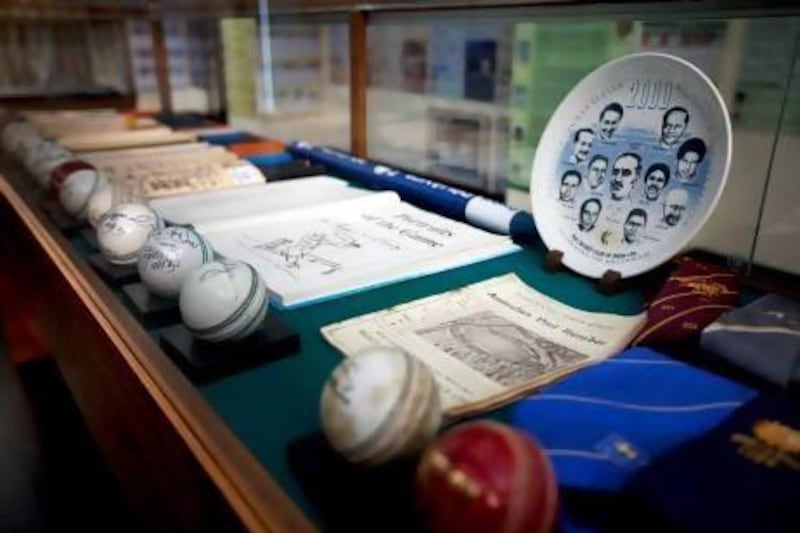DUBAI // A private cricket museum built by a Dubai businessman has turned into a must-see destination for young enthusiasts of the sport in the region.
The collection began with dozens of autographed balls and bats collected in 1981 by Shyam Bhatia, the founder and chairman of Alam Steel, one of the oldest and largest steel companies in the Arabian Gulf.
The cricket treasury now fills a spacious 371-square-metre gallery in the compound of Mr Bhatia's Jumeirah residence.
Saturdays are very busy, when children from cricket academies and schools book appointments to view the several hundred autographed bats, balls, helmets, stumps and T-shirts that belonged to international cricketers.
"The coaches tell the children they have time for an hour and then it takes them double that time to get the children out," said Mr Bhatia, 70, whose collection has been built from mementoes gifted by visiting cricketers and his purchases from auctions and other collectors.
"Kids are already very knowledgeable, but they are so eager to know more and to read about the history of cricketing countries and World Cup matches."
Cricketing history covers the museum's columns with information about captains and top players from countries such as Australia, India, Pakistan, England, South Africa and the West Indies.
Walls are etched with data and photographs from World Cup games, including some of the 1975 championship trophy being held aloft by the West Indian skipper Clive Lloyd.
A bat signed by the Australian batting legend Don Bradman has pride of place alongside his batting statistics, while the blue Indian team tie and jacket of batting hero Sunil Gavaskar adorns another section.
Autographed bats line the walls, signed cricket balls are placed in long, glass cabinets, old and new cricket tomes are displayed in a floor-to-ceiling bookcase and colourful paintings of cricketers such as Australia's Steve Waugh, South Africa's Lance Klusener, India's Kapil Dev and Pakistan's Rameez Raja are hung near glass-window etchings of batsmen and bowlers.
Karthik Shekar, captain of the UAE's under-16 cricket team, was impressed by the historical detail.
"I found it amazing," he said. "It really motivates young players to see the achievements of the greats, and helps you remember to stay focused on the game."
Shorye Chopra, 15, the captain of Dubai Modern High School's cricket team, has visited the museum several times.
"It's an important place for us as students because it increases our cricketing knowledge, and also shows us the kind of fame you can achieve if you are successful in cricket," he said.
The brothers Abhishek and Ashish Ganapathy lingered in the sections on Bradman and the West Indian cricketer Brian Lara.
"There is so much information we can gather looking at the records, and it's great to see so much history stored for future reference," said Abhishek, 12, from Our Own High School in Al Warqa.
The gallery has drawn dozens of cricket celebrities since it was formally opened two years ago but it is the youngsters that Mr Bhatia aims to inspire.
When he moved to Dubai in 1965, Mr Bhatia played cricket and was one of the founding members of the Dubai Cricket Council.
Nicknamed Mr Cricket in the region for his contribution to the game, he donates cricket kits to underprivileged children worldwide as part of his charity, Cricket for Care, and organises annual awards for promising young local cricketers.
"I want to give back to the game, and I want to give back through children," said the entrepreneur, whose first job was in a Dubai insurance company before he set up his own building-materials business.
"Cricket has given me spirit and helped me in my business because it has taught me discipline, teamwork and leadership. I tell all the children I meet that if they apply the game's principles in life, they will not look back," he said.







